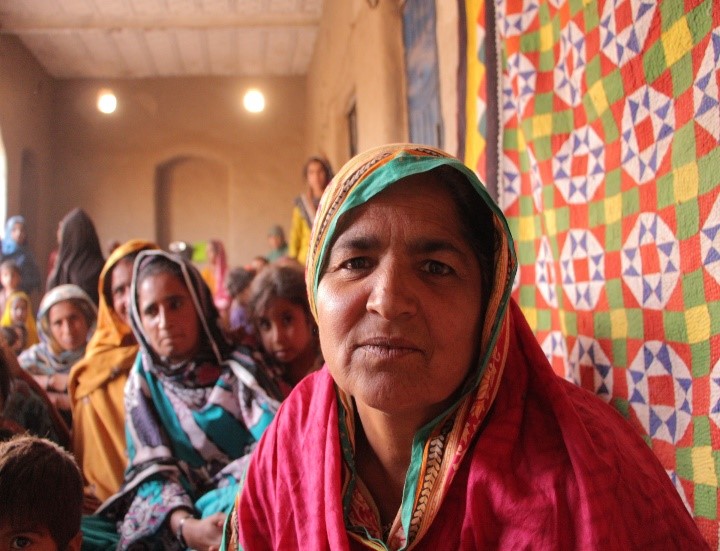

“I came up with a firm belief that change is inevitable and took step in organizing women of my village” shared determined Bibal Bibi.
Bibal Bibi became grieved while sharing that people of village Major Chandio District Matiari have a long history of conflict over water distribution which have been transferred through generations. People even do not bother to visit each other in times of happiness and sorrows. The adverse aspect of the ancestral conflict restricted communities to think about rest of issues of village. The village, comprising of 159 household, was occupied with water distribution issue for years, and no one was keen to solve the problems such as improving agriculture yield and prosperity of the village. And that’s the reason why 44% household still live in below poverty level.

Koonj: A leader for Behavioral Transformation
Bibil further added that, in June 2016, NRSP came to their village and they gathered at Umar Zadi’s house, where they formed a community organization, like other women of the village, it was also a new experience for her and she realized that besides household chores, they can also equally contribute in development of the village. In the gathering, Umar Zadi contributed by saying that, utilizing the community organization platform, they can solve the village problems collectively on self-help basis.
“When I heard women talking about the importance of CNIC, health, education and other issues of our village, it was a pleasant moment for me which I can’t express in words”, said Bibal with a hopeful smile on her face. There has been a transformative change from conflict on water, towards pondering on access to safe drinking water for every household, which is a paradigm shift in minds of the people, created through social mobilization. “Now we are more concerned on educating our forthcoming generations.”
“I was convinced to be part of this change process; however I required consent of my elders who value the cultural traditions of our society. Being widow and dependent on brothers, it was difficult for me to participate actively. And I encountered enormous resistance from society initially but somehow with the passage of time, I convinced my family members by making them realize that this is a collective effort and a first step to break the vicious cycle of poverty. We formed a community organization comprised of 25 members including those households having long history of conflicts over water distribution. Now, us, the women of the village sit together and discuss village’s issues in our regular meetings and then we discuss the same problems with our counterparts, such dialogue process has significantly minimized the conflict in our village”.
Since November 2016, there are 4 community organizations formed in the village in which 85 women members have been organized. Approximately 53% households of the village are struggling to reduce the poverty in the village. Bibal is the president of her CO, and Manager of VO, and elected information secretary of LSO. Bibal gave an analogy of a crane bird, called ‘Koonj’ in local language, that flies in a ‘V’ shape, symbolising victory, and the leader of the flock bears the wind pressure making sure every ‘koonj’ safely arrives at the destination.
“I am very much inspired of this leadership role and want to lead my organization with similar spirit and determination. We all need to work together for sustainable development in our village. Having achieved this, we are now planning on how we can enroll each and every out of school child, how we can develop a water distribution and governance mechanism, how every member community can be given access to quality services. Now even the male members are endorsing our work rather than creating hurdles, this is because change is inevitable if there is will”, said Bibal Bibi.
“There has been a transformative change from conflict on water, towards pondering on access to safe drinking water for every household, which is a paradigm shift in minds of the people, created through social mobilization

This publication has been produced with the assistance of the European Union. The contents of this publication are the sole responsibility of National Rural Support Programme (NRSP) and can in no way be taken to reflect the views of the European Union.